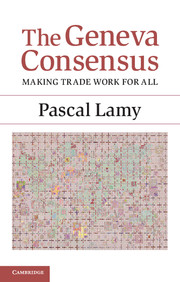Book contents
- Frontmatter
- Contents
- Preface
- 1 Harnessing globalization amid the crisis facing multilateralism
- 2 The changing face of trade
- 3 Helping the poorest up the prosperity ladder
- 4 Trade: friend not foe of the environment
- 5 Trading towards global food security
- 6 Trade can contribute towards better health
- 7 Trade and labour: separated at birth, but still connected
- 8 Trade and energy: the case for a greater WTO role
- 9 Trade and currencies: trading community seeks greater currency stability
- 10 Trade and competition: fairer competition makes for fairer trade
- 11 Trade and human rights: a case of misplaced suspicion
- 12 Corruption: a cancer that trade transparency can help to treat
- 13 Last but not least: the Doha Round
- Epilogue
- Index
8 - Trade and energy: the case for a greater WTO role
Published online by Cambridge University Press: 18 December 2013
- Frontmatter
- Contents
- Preface
- 1 Harnessing globalization amid the crisis facing multilateralism
- 2 The changing face of trade
- 3 Helping the poorest up the prosperity ladder
- 4 Trade: friend not foe of the environment
- 5 Trading towards global food security
- 6 Trade can contribute towards better health
- 7 Trade and labour: separated at birth, but still connected
- 8 Trade and energy: the case for a greater WTO role
- 9 Trade and currencies: trading community seeks greater currency stability
- 10 Trade and competition: fairer competition makes for fairer trade
- 11 Trade and human rights: a case of misplaced suspicion
- 12 Corruption: a cancer that trade transparency can help to treat
- 13 Last but not least: the Doha Round
- Epilogue
- Index
Summary
A decade ago only two of the world’s top five oil-producing countries were members of the WTO. Today Iran is the only country in the top ten oil producers that does not belong to the trade body. Only two of the world’s top ten gas producers are not WTO members; again Iran is one and the other is Algeria. But both Iran and Algeria want to join, as do all the other important energy-producing countries that remain outside the WTO, including Iraq, Libya and Sudan. The WTO already gathers under its roof countries responsible for the bulk of the world’s energy output and could soon house all of them. Yet the WTO is not as involved as it could and perhaps should be in helping oversee the world’s energy trade, which is an area where global governance could be improved.
Energy accounts for a significant part of world trade, but the WTO has relatively little to say about it. When the rules of the GATT were negotiated some sixty-five years ago, opening trade in energy was not a political priority. World energy demand was a fraction of what it is today and a barrel of crude oil went for US$ 20 at current prices, less than a fifth of the cost in early 2013. The world economy has changed dramatically since the 1940s and so have the energy challenges. The economic growth rates of many developing countries will inevitably push up global energy demand and make equitable access to supplies an ever more pressing issue. More energy production can lead to more pollution, so rising energy consumption will need to be reconciled with sustainable growth if we are to tackle the challenges presented by climate change. Massive private investments will be necessary to respond to the needs of research in green energy technologies, namely in renewable energy sources and energy efficiency, and investors will demand the reassurance of clear international rules and regulations.
- Type
- Chapter
- Information
- The Geneva ConsensusMaking Trade Work for All, pp. 111 - 121Publisher: Cambridge University PressPrint publication year: 2013



